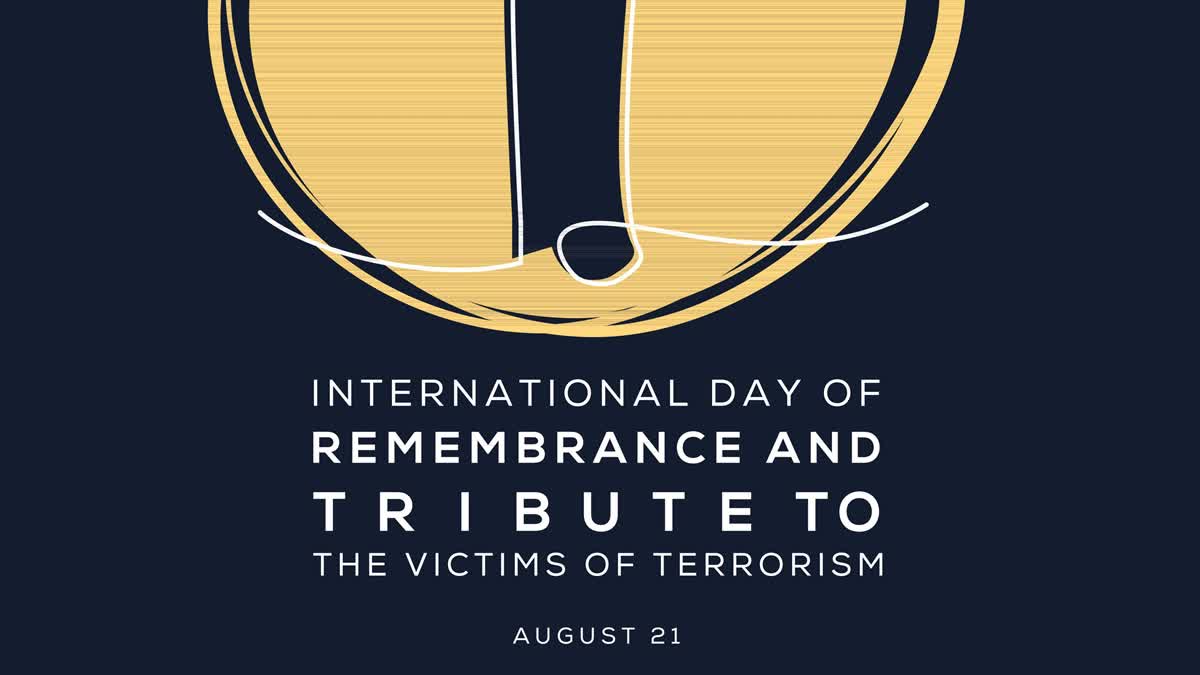Hyderabad: International Day Of Remembrance of And Tribute To Victims Of Terrorism is observed annually on 21st August to pay tribute to honour and pay tribute to victims of terrorism to stand by them.
Backround:
The UN General Assembly, in its resolution 72/165 (2017), proclaimed 21 August as the International Day of Remembrance of and Tribute to the Victims of Terrorism. The main focus of the International Day is to honour, remember and pay tribute to the victims of terrorism by standing in solidarity and promoting and protecting their human rights and fundamental freedoms.
What is Terrorism?
The word terrorism was first used to describe the "Regime de la Terreur" (the Reign of Terror) in France in the last decade of the 18th century.
Terrorism has been condemned as one of the most serious threats to peace globally. Terrorism violates all forms of security within a nation and its community, but more importantly, the whole world feels the impact of a terrorist attack and joins together in grievance for the victims of terrorism. This is what makes the International Day of Remembrance and Tribute to the Victims of Terrorism so incredibly important; to ensure people remember year after year the effects of terrorism, and to continue commemorating and recognising the brave victims of terrorism.
Significance of International Day Of Remembrance of And Tribute To Victims Of Terrorism:
The observance serves as a reminder of the sacrifices made by victims of terrorism and the ongoing need for vigilance against extremist activities. The day aims to raise awareness about the serious consequences of terrorism and the importance of maintaining peace, unity, and security.
The day pays tribute to those who have suffered or lost their lives due to terrorism.
The day encourages global unity against terrorism and support for it's victims.
The day also acknowledges the stuggles of survivors and their families, promoting their well-being and rehabilitation.
Voices for Peace: 2024 Event
To mark the seventh commemoration of the International Day of Remembrance of and Tribute to the Victims of Terrorism, a virtual high-level event titled "Voices for Peace: Victims of Terrorism as Peace Advocates and Educators" will take place on 21 August 2024.
The Secretary-General of the United Nations, António Guterres, will deliver remarks, which will be followed by opening remarks by the Under-Secretary-General for the Office of Counter-Terrorism, Vladimir Voronkov, a statement by the Group of Friends of Victims of Terrorism and testimonies from two victims/survivors of terrorism. A virtual panel discussion on the theme “Victims of Terrorism as Peace Advocates and Educators” will follow the high-level segment.
Negative Effect of terrorism:
Safety of Live: Living in countries impacted by terrorism means facing the constant uncertainty of safety in everyday life. Individuals in these areas may develop mental strategies to navigate the heightened risk of harm.
Lifetime negative effect on victims: Individuals experience post-traumatic stress disorders, anxiety, and major depression following terrorist attacks.
Moreover, individuals who have survived terrorist attacks are at a higher risk for developing substance abuse problems and psychosomatic symptoms in the aftermath of the attack. Kids are particularly at risk for the adverse mental impacts of being in danger of a terrorist attack.
Typically, children are more prone than adults to experience PTSD, anxiety, or depression as a consequence.
Impacts on human rights: Terrorism impacts every aspect of human rights outlined in all declarations, covenants, and conventions. The Universal Declaration of Human Rights guarantees the rights to equality, freedom from discrimination, life, liberty, and personal security, as well as protection from slavery, torture, and degrading treatment.
Impact on Tourism: Terrorism has a significant impact on tourists' decision-making regarding their destination choice and can have a strong negative impact on the hosting country. Additionally, the impact endures for a significant amount of time and influences the demand for tourism as well.
Impact on Economy: Terrorism decreases the ability of states to invest in projects that benefit the economy or society.
Impact of Trust: Terror-management and group-threat theories suggest that after a terrorist attack, individuals are more likely to reaffirm their cultural beliefs, reject outsiders, and identify more strongly with their own groups. These responses enhance group tolerance and unity, but can also lead to intolerance and distrust towards those outside the group.
Acts of terrorism promoting various hateful beliefs still hurt, harm, and kill numerous innocent individuals. Despite global disapproval of terrorism, individuals affected by terrorist acts find it difficult to make their voices heard, receive the necessary support, and have their rights respected.
Global Terrorism
The Global Terrorism Index 2024 (GTI) highlights that terrorism remains a serious global threat, with total deaths from terrorism increasing by 22% to 8,352 in 2023, now at their highest since 2017. Even when excluding the Hamas attacks of October 7th, deaths would still have increased by 5%. This is despite terrorist incidents decreasing by 22% to 3,350, resulting in a 56% increase in the average number of people killed per attack. This is the worst rate in almost ten years.
Violent conflict remains the primary driver of terrorism, with over 90% of attacks and 98% of terrorism deaths in 2023 taking place in countries in conflict.
Burkina Faso suffered the worst impact from terrorism in 2023, with deaths increasing by 68% despite attacks decreasing by 17%.
In Iraq, total deaths have fallen 99% since their peak in 2007, with incidents falling 90%.
India:
India is currently ranked 116th globally in the GPI 2024, which is a significant improvement from its 126th rank in 2023, 139th in 2020, and 141st in 2019.
India introduced Prevention of Terrorism Act, 2002 to prevent the Terrorism. The Prevention of Terrorism Act, 2002, seeks to deal with types of heinous crimes like subversion, insurgency and terrorism in place of the existing criminal justice system, which is not designed to deal with such horrific crimes.



